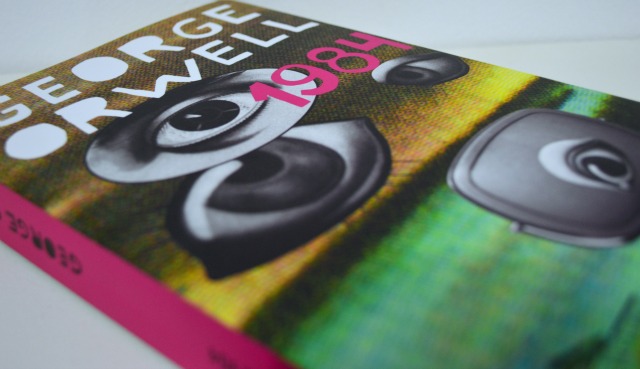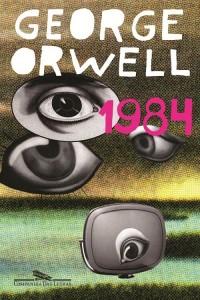
“Winston, the hero of 1984, George Orwell’s last novel, lives trapped in the totalitarian machinery of a society completely dominated by the State, where everything is done collectively, but each one lives alone. Nobody escapes the surveillance of Big Brother, the most famous literary personification of a cynical and cruel power to the infinite, besides a void of historical sense. In fact, the ideology of the dominant Party in Oceania is aimed at nothing at all, now or in the future. O’Brien, Party hierarch, is the one who explains to Winston that ‘we are only interested in power itself. Neither wealth, nor luxury, nor long life, nor happiness – just power for power, pure power.”
1984, a classic by George Orwell, was one of the books that had been on my wish list for a long time, more precisely as one of the practically mandatory readings in my experience as a reader. Being one of the parents of dystopias, he inspired several current works, in addition to Big Brother, a world-famous reality show program.
Narrated in the third person, the book brings the story of Winston in the year that gives name to the work, in London, belonging to Oceania, superpower controlled by the Party, totalitarian government commanded by its leader and symbol, the Big Brother. The protagonist belongs to the External Party, a social class intermediary to the Party Nucleus, the most privileged, and to the “proletariat”, the most disadvantaged and predominant. In addition to Oceania, there are two other superpowers, Eurasia and Eastia, constantly at war with each other. Winston, while under pressure to accept the current system, ends up intimately rebelling against him and, upon meeting Julia, with whom he falls in love, they both go on a secret revolt against the Party, united by a love for each other and the desire to freedom.
Firstly, it is interesting to follow the characteristics of the society described, as well as each of them influenced so many of the contemporary dystopias, read not only by young people but by readers of all ages: the hierarchy of social classes; government oppression and violence; the alienation and distortion of the truth as a form of control. In particular, it was impossible not to remember, especially, The Donor of Memories, by Lois Lowry, mainly because of the government’s attempt to control emotions and human and family relationships.
Furthermore, George Orwell’s own writing is worthy of attention. While there seems to be a certain distance and simplicity in his words, there are moments of greater intensity and sensitivity, including with regard to the relationship between Winston and Julia. There is a certain romanticism between them that I did not expect to find during reading, and I was surprised by Orwell’s delicate and almost poetic narrative at those moments.

However, the great asset of 1984, for me, lies in the psychological construction of the plot. It is the way in which the Party manages to influence the minds of individuals that guarantees power to it, and the level reached by the human being is terrifying, what it becomes when taken by a distorted truth. George Orwell was able to masterfully demonstrate human and societal disintegration precisely because he managed to reveal the weaknesses and cruelty of men; 1984 is not just a criticism of totalitarian governments, but, above all, a warning about the corruption and subversion of man, an evil to which he is subjected when exposed to his worst fears.
1984 does not provide a fast or frantic reading, which does not mean it is not a good read or even uninteresting. On the contrary, it is a full plate for anyone who knows how to appreciate its particularities and grandeur. George Orwell, in his latest novel, described a somewhat feared futuristic society. Today, distant for more than 30 years from the time he imagined, his work remains current with regard to the dangers suffered by a man when his greatest weaknesses are exposed, and when there is the inexhaustible desire for power coupled with the deepest cruelty of the soul itself human.
Sources: https://www.theguardian.com/books/2019/may/19/legacy-george-orwell-nineteen-eighty-four